Capitalism: The Season Wrap-Up
Podcast: Play in new window | Download
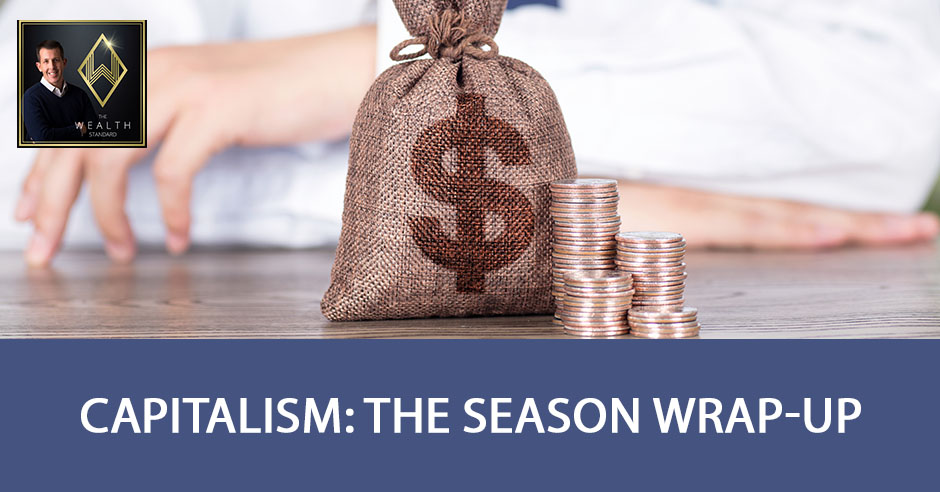
—
Watch the episode here:
Listen to the podcast here:
Capitalism: The Season Wrap-Up
It’s hard to believe that we are at the end of yet another season. This season, we are focusing on capitalism. It’s been fun. We have one more guest which I think is going to end the season with a bang. It’s probably the most excitement I felt in regards to interviewing a guest in a long time. I’ve had some pretty amazing guests but this individual and I have only had a couple of conversations. The one that we did have was at an incredibly high level with some very high-level people. I can’t wait to talk to him again about the principle of capitalism to summarize the season in a sense and then transition us to the next season. If you haven’t read all of the episodes or didn’t know that we were focused this particular season, the first four months of 2019 on capitalism, go back and check out those old episodes. You can go to TheWealthStandard.com or obviously check it out on Spotify or iTunes whichever you’re using to listen.
I want to transition to the topic for next season. I want to summarize the episodes that I’ve done, the content that we’ve covered, the interviews that I’ve had, what I’ve learned and some of the topics and the main points that have stuck with me. I want to make a request of you. I want to hear from you guys and I haven’t done this before. I’m going to give out my personal podcast’s email because I want to hear about what you’ve learned. I want to hear about what’s been enlightening for you. I want to hear what you didn’t like too, whatever. I just want to hear from you. If you guys would reach out, it’s Patrick@PatrickDonohoe.com. In this episode, I’m also going to talk about the next season and my ideas there. I’m going to introduce that topic and so hearing what you guys think about it is important to me. If you have ideas or you like or dislike something or you want to have a specific guest, I’d love to hear that feedback.
Defining Capitalism
Capitalism is one of those words throughout the season that gets the hair on people’s necks to go up. They get ticked off. It leads to very high emotional debates and battles. What I’ve concluded is the following. I believe that most people, and I would include myself in it, don’t understand the true nature of capitalism, what that system does to the human experience and to life. I’ve realized that the definition is important. Understand that word because many believe that capitalism is exploiting the lives of others and sacrificing them for personal gain. I think that’s very propaganda-ish and that is not the definition of it and that happens. People sacrifice others, they cheat, they steal and they exploit. I don’t define capitalism as that. I’m not sure what the definition of that is but I understand that people do that. I understand that big business has received a branding of sorts when it comes to that.
There’s always going to be human nature involved. I realized that people are going to take advantage of others for their own gain. I’m not looking at capitalism like that. The system of a free-market, laissez-faire capitalism, I truly believe is the framework to achieve the highest degree of happiness in life. I’m going to try to make that argument in this episode. I look at the past shows and I talk specifically about Italy, some of the things I’ve learned there. I’ve looked at the world slightly differently as I’ve done this season. I look at how amazing is the life we’re all a part of. The technology that exists, the things we’re able to experience, I realize that it’s not necessarily the life that some people want. I look at as much as technology and as much as the progress that we’ve made have helped us. It’s also made people somewhat lazy, spoiled, complacent and I put myself into that category.
I don’t know if I’d be able to survive if I was in the 1800s, raise crops, not have heating and air conditioning or electricity. At the same time, I look at how our lives, as much as they seem easier, they’re much harder. The connection I’ve made to what I see as the framework or the system to bring about the achievement of the highest level of happiness in life, it comes down to us being able to discover what our strengths are, what our natural abilities and talents are. We apply those in a way that helps others but it’s not a one-sided help.
Innovation and creativity is not about following orders. It's quite actually doing the opposite. Share on XIt helps others but yet it also provides an exchange where we also receive. I look at what I’ve discovered in 2019 with some different business coaches that I’ve changed to. One of them has taught me something that seems common sense, but it’s been incredible how it’s reframed my perspective of those people that I work with. There are 60 some odd people that I work with and it’s changed everything. I think it applies to this very principle. What I’ve learned is when somebody is doing less than 80% of their work outside of their core strengths, abilities and successful experience, then they’re not going to be happy. If they are, it’s for a very short period of time.
I’ve learned that the equation to a high level of engagement, participation and excitement with regards to work has to do with working 80% more in what you’re strong at, coupled with meaningful targets or goals, as well as the appropriate incentives and a good level of accountability. I’m going to get into that as we transition to next season’s themes. What this does is it allows me to see a person’s strengths, have them work and do things within those strengths. I delegate whatever else that may have been their responsibility but ultimately, they’re weaknesses to somebody else. It’s been remarkable to see the difference so far and we’re instituting a few other things when it comes to projects and so forth. I believe that everybody has strengths, talents and abilities. In large part, they’re always evolving. The discovery process isn’t this you wake up one morning and suddenly you know what’s strong about you. You are in an environment and in that environment, you exercise whatever that strength is whether you’re conscious of it or not. You receive that fulfillment, you receive that degree of achievement because you know that you’re good at something.
Pursuing Solutions
That’s why I’m saying that capitalism, that type of system, allows for the free discovery of that. If someone has to figure things out, if someone has to work with others, if someone has to get an outcome as it relates to work, then they’re either going to do it or they’re not going to do it. If they’re given clear direction, clear outcomes as far as what they’re supposed to achieve and then they’re given the environment that it’s free for them to figure it out, they’re either going to do it or they’re not going to do it. That’s the discovery of weakness and the discovery of strength. If they figure it out, there’s an enjoyment and a sense of satisfaction that comes from that. It has been phenomenal to understand that perspective of things. I believe that that system of capitalism, whether it’s on an individual level or on a group level, human beings want to figure things out. They want to solve a problem. We’re hard-wired to pursue that. That’s why when you look at a centrally planned government where the government is solving problems. They’re creating jobs, they’re creating solutions for this and solutions for that. That is not the same incentive.
That’s where I believe that a lot of the horrible examples, whether it’s Venezuela or the former Soviet Union, why those societies end up in poverty, disarray and war. It’s because of the wrong incentives that the environment does not have the structure where it’s incentivizing people to discover what’s good about themselves and apply that to a meaningful solution to a specific challenge. I think it goes globally with those huge examples but it also goes down to the workplace. The individual examples as far as achieving satisfaction, happiness and growth. That’s where I’ve settled and I did have a thesis or an idea of what capitalism was to be. I went into my interviews with that opinion although trying to retain an open mind. I had conversations with Jason Rink, Yaron Brook and Larry Reed, the President of FEE, Foundation for Economic Education. Hopefully, those opened your mind to the notion of the human spirit. It’s the notion of what a human being is capable of, what they can do to create miracles. You look at lighting, you look at electricity, you look at computers and technology. It continues to evolve that is the expression of what talents and strengths are within people.
It’s only gotten better, and even though we don’t have a purely capitalistic society, it’s not a completely free market and laissez-faire which means hands off. It’s not 100%. It’s not absolute, yet just some of it. What that does to create these miracle inventions and innovations that are making all of our lives easier, came from the idea of a person. That’s what people are driven to do. I believe that the more they’re allowed to do that, the more solutions, the better solutions and the more efficiency you’re going to have. I went to Tony Robbins, his Platinum Partner Finance Event and I put some of the summary videos and talked a little bit about it on the podcast. You can go to YouTube and look at those summaries because I did a summary video for every day of that event. One of the things that go through my mind is the presentation by Peter Diamandis and specifically the XPRIZE. The XPRIZE is a prize for whoever wants to participate and they get a prize. I think it’s a $10 million for the one that he is proposing with Tony Robbins but it provides the challenge. Peter Diamandis is an insanely intelligent individual.

Capitalism: The more people are allowed to innovate, the more better solutions we have and more efficiency.
He doesn’t have the talents and he also does not have the resources to accomplish what his XPRIZE is awarding. The one that they’re working on is to figure out a way to take the stem cells of a cattle and grow beef. I think it’s wagyu or Kobe beef with those stem cells and do it for a $1 a pound. The thing is they’ve already figured out how to do it. It started at $3,000 a pound then it went to $300 a pound. They’re trying to get it to a dollar a pound. He doesn’t know how to do it even though he’s a brilliant person. He realizes that inside a group of human beings exists the knowledge to do that. He has created that award and that incentive. It goes back to what I was saying before about the workplace. If you help a person discover their strengths, acknowledge them and put them in a position where they’re able to accomplish something you want to be done. Have an incentive to do it and some accountability associated with it. That is where the ultimate satisfaction of the workplace exists. I know that there’s a lot of details behind that but generally speaking, that’s what I’ve discovered, read about and actually seen outside of my company, the success of that.
Looking at the XPRIZE, I think it’s $10 million, the XPRIZE for Tony Robbins and Peter Diamandis are putting together. It’s to essentially figure out a way to get stem cells out of cattle and grow beef for $1 a pound. There are probably other weirder XPRIZEs as well but I know that one is very important because the emerging market’s demand for beef is making our environment worse. The demand for water, the emissions that cattle produce and the fact that they’re taking up 30% of the landmass, it doesn’t seem sustainable. I won’t go down that path any longer. The idea from what I’m saying is that within a human being is the ability to achieve. Achieving with alignment to their strengths and their abilities that they’re born with and cultivate over time what is going to create solutions to all the challenges that we have as well as the challenges that we foresee in the future. As much as it seems like a centrally-planned government, they have this altruism about them where they have the best interest of people in mind.
I think there’s some truth to that. However, it doesn’t produce the environment in which people are incentivized to take who they are, what they’ve learned and to receive the remuneration, receive the actual compensation, the results by them providing a solution. Those are the different criteria that exist in order for humans to feel alive, to feel that they’re achieving things. I’ll bring up an example that, it’s interesting. In 2018, I interviewed Andrew Yang. Andrew Yang is running for President of the United States. He is probably the foremost technologist if that’s even a word, but he’s campaigning with hologram technology. He also is younger and has a pretty good sense for marketing. I believe he is making waves. He was on the Joe Rogan Podcast. He has been interviewed on a number of other forums. He’s gotten his word out there and his tune is the same as what existed on the interview that I had with him. He just hadn’t made the waves but Andrew Yang is on to something with regard to how fast technology is evolving.
Lessons From The Guests
At the same time, he’s using the same notion that essentially planned governments have used in the past, which is taking care of people in providing a solution. What that does, I believe is it discounts the millions and millions of people that have the potential seed in their mind to come up with a way better solution that he’s going to come up with. Giving people money robs them of the ability to go out and discover what is best about themselves, what their strengths are and how that applies to the well-being of others. What’s interesting is that those environments sometimes have to be very difficult. With the rock bottom scenario, sometimes people wake up and they’re like, “I’ve got to do something. I’m going to die or I’m going to live and sometimes that’s what it takes.” Let’s dive into a few other things in relation to what I’ve learned from some of the guests and then let’s make the transition. Larry Reed and G. Edward Griffin have been an inspiration to me. The things that he discovered over the years, how he’s come to believe in human nature and what he’s driven by aligns with some of the things that I’m saying and much of which I’ve learned from him.
I look at just the experience that he’s had writing The Creature from Jekyll Island. We didn’t touch much on a central bank and how that also impacts everything that we’re talking about the market, not being able to find a solution. People not being able to find that solution or any paper over it with money created out of nothing. I won’t go down that path, but I believe that if you google G. Edward Griffin, you can learn about his principles and learn about his philosophy. It’s in line with laissez-faire, free market and capitalism. I do believe that is one of the reasons why he wrote his book and also why he continues at his mid-80s age, to continue to push forward the principles that he believes in by the documentaries that he’s a part of also but also does the events that he puts on. The newsletter that he does is because he’s driven to allow others to understand what these free market, I would say libertarian sense of principles, how they apply to the individual.
Capitalism allows for the free discovery of your strengths and weaknesses. Share on XDavid Stockman, that was also an awesome interview. He’s obviously been a contrarian for so many years and has pushed against intervention by the government when it comes to markets, when it comes to the signals that get a person to figure out a problem are manipulated. It confuses them and they’re not able to exercise their strengths, their abilities and their experience to figure out a solution. You have all sorts of intervention that misprices and then also creates false signals. That was a fascinating interview. Andy Tanner, we talked a lot about Greg Lukianoff’s book, The Coddling of the American Mind and it’s always a pleasure to talk with Andy. We mentioned it on the podcast but we spoke for more than six hours that day because these are things that we love to talk about. They’re things we believe, they’re principles that we know will make a difference if they’re understood by more people.
I know that the whole free speech thing has been in the headlines quite a bit. I look at just the ability for people not to speak their mind, not talk about their opinion and have the fear associated with doing that is a slippery slope. When you have an environment of youth, they’re in this transitionary stage of life where they’ve grown up with the philosophy of their hometown and their parents typically. They go to a school system where it has multiple people and multiple experiences. There’s this ideology in the sense that people have to think a certain way. If they don’t, then there’s fear associated with saying things differently or expressing yourself in a different way. It’s polarizing and that is a slippery slope because you don’t allow for the experience of multiple perspectives because those multiple perspectives helped to reinforce certain beliefs and principles or maybe call into question those beliefs and principles that may not be principles.
It was pretty fascinating talking to Andy about that and then of course, David Morgan. I would say they’re very in alignment with David Stockman in relation to how commodities work and paying attention to that as far as investment is concerned. David Collum, that was such an enjoyable interview. You can sense his passion for understanding markets and understanding where we’re at in cycles and talking about it, even though his specialty is chemistry at Cornell. That was a fascinating interview and I enjoyed reading through his year-end review from 2018. A lot of what he said and mentioned, I’ve thought about and it actually made me think a little bit differently. It gave me more detail about what’s going on, whether it’s the pension crisis, whether it’s central banks, whether it’s market returns. There’s so much information packed into that.
Finally, the last two interviews, Connor Boyack and Josh Lannon. I believe that he practices what he preaches. That book that he wrote, The Social Capitalist, he’s trying essentially to take the principles that I’ve been mentioning here and mentioning throughout the entire season. It solves the social problems that exist. Here in Utah, we’re battling a major epidemic with opioid addiction. It’s used by young adults and youth as well as suicide. Youth and teen suicide are incredibly high. When you start to have these types of problems, nobody wants those problems. People want solutions but when you go down the road of having governments institute this and governments institute that, it’s going to come up with the same result. Even though the intentions may be so genuine, there are people out there that have ideas in their mind strengths and their mind talents that are waiting to be expressed. There are solutions to a lot of these challenges and a lot of these issues. I think that’s what Josh and my conversation, and the mission that he’s on.
Application Of Capitalism
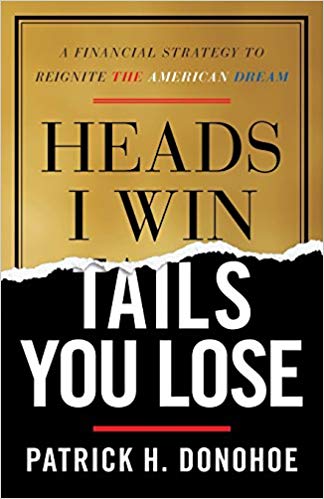
Heads I Win, Tails You Lose: A Financial Strategy to Reignite the American Dream
The mission of conscious capitalism or social capitalism is to identify these epidemic issues, these challenges that exist and will exist. It will essentially allow people to rise to the challenge and provide solutions as opposed to leaning on the government to do it for us. If you guys want to email me and give me your feedback at Patrick@PatrickDonohoe.com, it would be huge for me to hear what your thoughts are, where you disagree with me, where you agree or maybe some epiphanies that you had. What aspect of the conversation was most intriguing to you. The transition, when I wrote my book, Heads I Win, Tails You Lose: A Financial Strategy to Reignite the American Dream. This is why I did the season in 2018 focusing on life, liberty and property. I believe that those three variables create the dynamic for a person to truly experience the American dream.
I define the American dream differently than most define it, not owning a home or, getting a job with benefits, putting money into your 401(k) and retiring. To me, that is not the American dream. The American dream is to come to an environment where there’s freedom in order to discover what is best about you and how you can essentially bring that to the world. You bring that to others and receive the remuneration, receive the compensation for that. I believe that truly is one of the purposes of our lives. In the book, I went down that path of calling into question our school system and where it originated, which is from a Prussian framework. It was to train military and factory workers. We still follow it and that’s not necessarily the path for most. I’ve mentioned Robert Kiyosaki’s book, Why ‘A’ Students Work for ‘C’ Students and ‘B’ Students Work for the Government or something like that. It’s pretty funny.
It’s true because ‘A’ student mentality is following orders correctly but innovation and creativity, it’s not following orders. It’s actually doing quite the opposite. I think that’s why ‘C’ students below are the ones that create such amazing things. Anyway, I won’t get on that path but I don’t believe our school system functions that way. I don’t believe our workforce and workplace is set up to function that way. It’s set up to have people take orders. I don’t believe that’s a way in which innovation occurs. It’s frustrating when you have that system in place. I ventured off and had a researcher look into all of the jobs that she could find that pay more than $50,000 a year that you can do either as a contractor, a freelancer or do it from home, some W2 jobs.
I was flabbergasted as to how many jobs are out there. I took the next step and started to investigate the gig economy. The statistics, you have to take them in stride. Some have an agenda behind them. Some are accurate, some don’t have the sample size that you need but it’s pretty interesting to see. Some of the studies that are being done, where companies are essentially transitioning to a lot of their workforce being freelance, being 1099 contract workers or work from home. There are big companies out there that have their entire workforce offsite or remote. It’s fascinating. I look at that statistic, but I also realized that part of this American dream, part of a fulfilling life, a life of achievement is not to stop working which is the definition of retirement but it’s to continue to provide value.
That doesn’t mean that you worked for the rest of your life. What it does mean is that you take your strengths, the successful experience, the things that make you feel alive and do that forever. It maybe ten hours a week and maybe six months out of the year. It might be twenty hours a week or it might be longer but it’s essentially continuing to exercise those talents, those abilities that you have and will have as you continue to discover them because it’s an evolution. It is necessary for a fulfilling lifestyle. With this research that I had, a researcher dived into it and she’s actually helping me to write a white paper about it. It’s the future of work and how you can live a fulfilling lifestyle without having to retire and much sooner than retirement age. It’s very difficult to chew on this. That’s what I’m going for this season. It’s to discover the individual application of capitalism.
It can be defined by entrepreneurship or entrepreneurialism. It can be defined as discovering a side hustle. Essentially, it’s the future of work and it’s discovering ways in which you can understand the definition of your ideal lifestyle. Where do you want to live? What do you want to do? It’s figuring out how to do it, how to discover what your strengths are, how to maximize those. The success and happiness in the workplace are when somebody spends 80% or more of their time working in something that is their strength and their experience. It’s coupled with goals and initiatives as well as the right incentives. It does not always have to be monetary incentives. That right there is the equation for success in the workplace. Obviously, there’re other variables but those are the primary. That’s where we’re going to transition. In the book, I talked a lot about the human life value statement and creating that. The human life value statement is the assets or strengths, talents and abilities.
The liabilities are your weaknesses, the stuff that you don’t like doing. You have income which is the result of your assets. How much of your income is coming from those strengths and those abilities? How much income is coming from liabilities? What you want to do is increase your expenses, when it comes to your weaknesses and the stuff you don’t like to do. You can maximize the time associated with not only spending it, doing your strengths and abilities but also maximizing those, refining those, discovering more about them. That’s where we’re going to focus on. There’re some guests at that I’m thinking about. The founders of Upwork.com and Freelancer.com, there are some individuals I’ve interviewed in the past that talked about taking your company and making it remote or you working remote. There’re a couple of other guests that talked about The Boomer Revolution, John Tarnoff.
We may have him on as well but this is the angle. It’s to basically take these very philosophical principles of laissez-faire free market capitalism and applying those to the individual. That’s why I’m going to do this go round. Let me know what you think. Thank you so much for reading. I do this because I love talking about this stuff. It’s what lights me up. It’s why I’m staying super late doing it. I’ve seen people benefit, whether it’s the inspiration they receive from it, whether it’s taking the practical advice from what they’ve learned here. I’ve also experienced many people that have been able to make a transition to a life that they never dreamed of by understanding some of these principles. That’s possible for you. I’m excited to talk about some of the things that I believe will make a difference in your life. Thank you for your support. For those of you who are clients of Paradigm, thank you. Thank you for continuing to read the blog and I can’t wait to hear and I haven’t asked much of the audience in the past.
I haven’t said, “Go download this or go seek this out.” I’m excited to hear from you guys. I’m excited to hear what’s going on in your life. I’m excited to hear what you like about the podcast, what you like about some of the guests and things that you’re learning. I’m also excited to hear about what you don’t like. I don’t want to be providing things that piss you off and worsen the experience of your life. That’s not the intention by any stretch. I’m excited to hear about what’s going well, where you’re coming from, what your goals are and where you’re trying to achieve. Patrick@PatrickDonohoe.com is my personal podcast email. I’m going to respond to it. It may take me a little bit. It may take time to do it but I’m going to respond to all of them. I hope you enjoyed it. One of the best guests to round out the season, this guy is young but he understands these principles at a deeper level than I do. I’m excited for him to express some of the things that he feels about the principles of capitalism, how they have to do with our society as a whole. I’ll be with you next time.
Important Links:
- Spotify – The Wealth Standard
- iTunes – The Wealth Standard
- Patrick@PatrickDonohoe.com
- Jason Rink – Past episode
- Yaron Brook – Past episode
- Larry Reed – Past episode
- Platinum Partner Finance Event
- Peter Diamandis
- XPRIZE
- Andrew Yang – Past episode
- Andrew Yang on Joe Rogan Podcast
- G. Edward Griffin – Past episode
- The Creature from Jekyll Island
- David Stockman – Past episode
- Andy Tanner – Past episode
- The Coddling of the American Mind
- David Morgan – Past episode
- David Collum – Past episode
- Connor Boyack – Past episode
- Josh Lannon – Past episode
- The Social Capitalist
- Heads I Win, Tails You Lose: A Financial Strategy to Reignite the American Dream
- Why ‘A’ Students Work for ‘C’ Students and ‘B’ Students Work for the Government
- Upwork.com
- Freelancer.com
- John Tarnoff – Past episode
- Paradigm

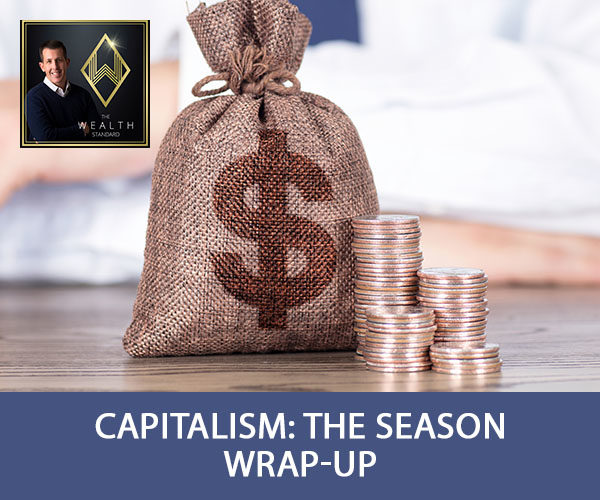
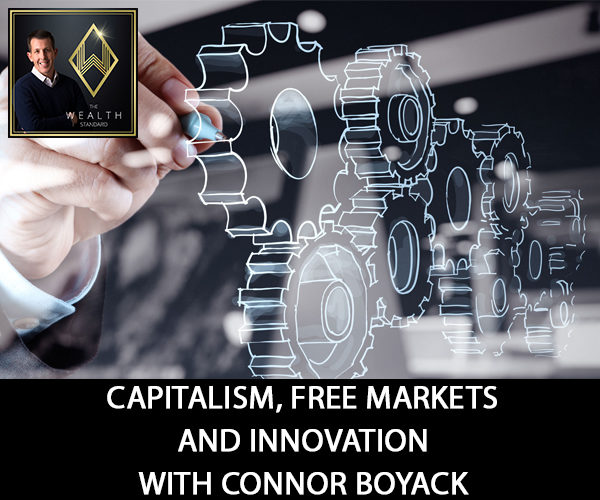
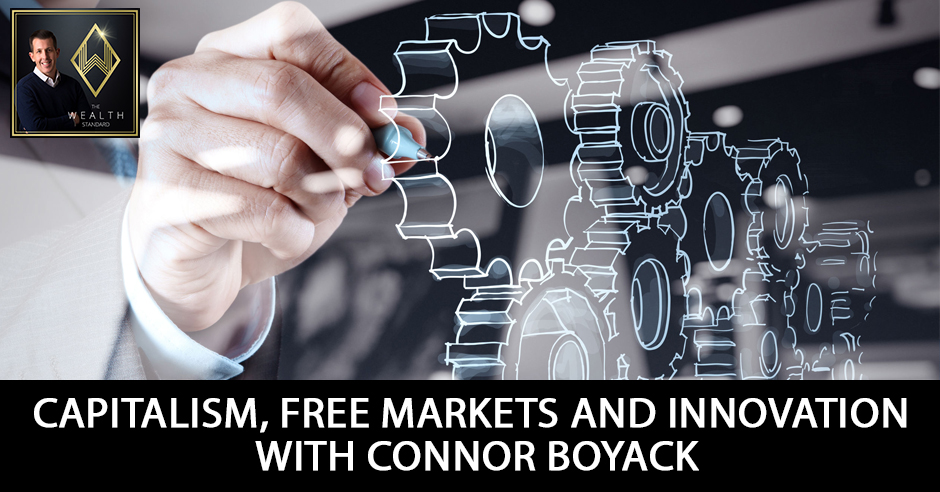

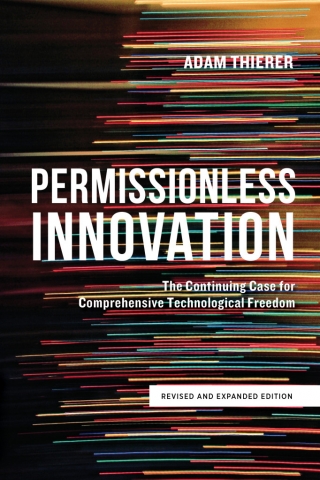


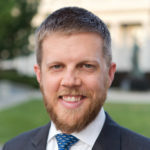 Connor Boyack is president of Libertas Institute, a public policy think tank in Utah. He is also president of The Association for Teaching Kids Economics, a national organization helping teachers educate their students about the free market.
Connor Boyack is president of Libertas Institute, a public policy think tank in Utah. He is also president of The Association for Teaching Kids Economics, a national organization helping teachers educate their students about the free market.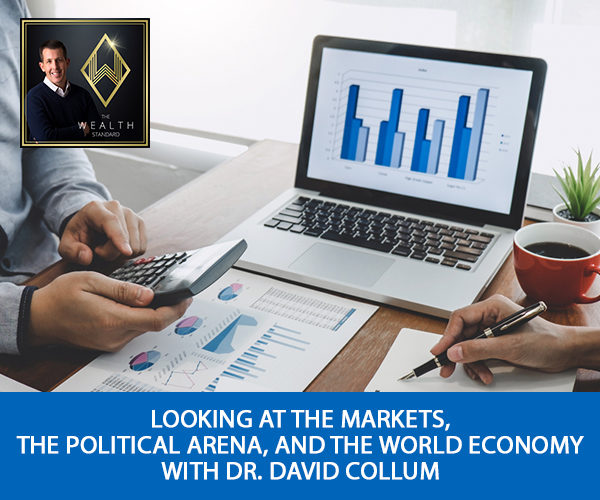
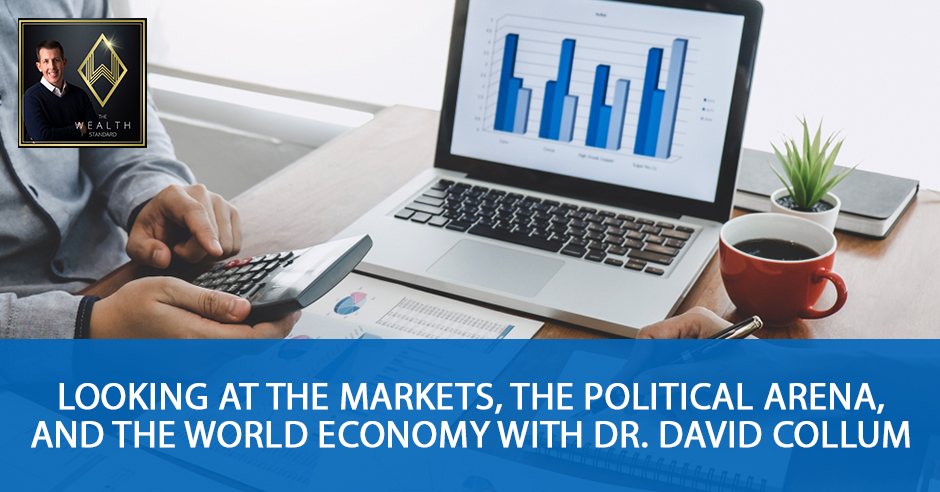




 David Collum is the Betty R. Miller Professor of Chemistry at Cornell University and is a regular and valued presence on the internet commenting on the financial system and the predicaments of our time. David has contributed many Year in Review articles and podcasts to the Peak Prosperity community, all of which are available online at
David Collum is the Betty R. Miller Professor of Chemistry at Cornell University and is a regular and valued presence on the internet commenting on the financial system and the predicaments of our time. David has contributed many Year in Review articles and podcasts to the Peak Prosperity community, all of which are available online at 













